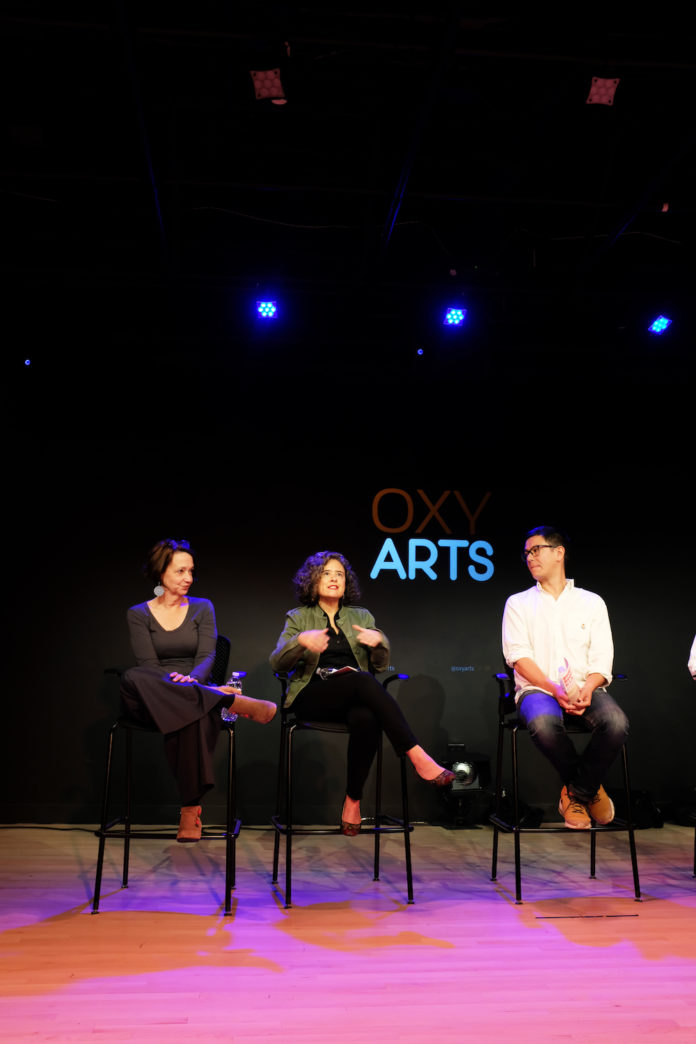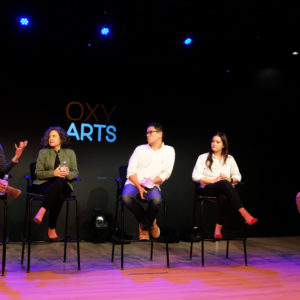
Oxy Arts hosted an “Art of Food Writing” panel Oct. 9 as a part of their “Breaking Bread” series. Occidental students and members of the Eagle Rock and Highland Park communities sat shoulder to shoulder, filling out the intimate gallery space.Robert Sipchen, associate Writing and Rhetoric professor and former editor at the Los Angeles Times, moderated the panel, which featured LA Times food writers Jenn Harris, Lucas Kwan Peterson, Alice Short and Carolina A. Miranda.
“There is nothing nicer you can do for someone than cook them a meal,” Alice Short, editor of Deputy Column One and former editor of LA Times Magazine, said.
Jenn Harris, a senior writer for the LA Times food section and unofficial fried chicken queen of Los Angeles, said that her family life was centered around food.
Lucas Kwan Peterson wrote for the New York Times Frugal Traveler column for three years before joining the LA Times staff.
“You can write about anything. Food writing offers you the flexibility nothing else does,” Lucas Kwan Peterson said. “You can write about politics, immigration, race.”
Caroline Miranda, LA Times Arts and Culture writer, said that food is part of the architecture of a place.

“Food is a network of stories that are not just about food but everything else,” Miranda said. “How does food fit into the landscape we live in [is the question].”
Sipchen questioned panelists about the food scene in LA, particularly the rise of food trucks and carts. Food trucks serve the community in more ways than one, according to Peterson.
“[They borrow from] the South American culture of eating on the street. Food carts and trucks are part of what makes LA what it is,” Peterson said. “The fears around food trucks tend to be racist and classist.”
In the Q&A session that followed, audience members asked the panelists about the role of food in sustainability and climate change.
According to Harris, if a food writer is going to do justice to a story, they will consider the intersectional socio-economic factors that come into play. These factors include the rising costs of rent, labor and ingredients.
“Who’s working there? Are they hiring locally? These aren’t solutions, but these are the questions we should be asking,” Miranda said.
According to the panelists, LA’s food culture is less pretentious than elsewhere in the country. Panelists discussed Michelin stars, a rating system that grades restaurants on their quality. According to Peterson, the Michelin system represents a New York-centric, Eurocentric view of culture.
“You can’t treat LA like New York,” Peterson said. “That’s not us. We don’t care about the same things. We like good food, but there’s not the pretense that surrounds it.”
Several of the panelists agreed that LA has the best food in the country — food that does not have to be sought out in fancy places. Emma Pottenger (junior), who attended the panel, found this analysis illuminating.
“I thought it was really interesting how Lucas Kwan Peterson was talking about how cool it is that due to the urban sprawl of LA, it has so many independent cultural food enclaves that have been able to really grow and serve the communities they were originally intended to serve, in a way that isn’t possible in more dense cities like New York,” Pottenger said.
Miranda and Short referred to Jonathan Gold’s documentary, “City of Gold,” which influenced the way writers approach food criticism.
“The movie is a love letter to Los Angeles and its food. It’s a movie about LA that isn’t about Hollywood, Beverly Hills or the beach,” Miranda said. “It is [about] the small cooks. Because of [Gold’s] praise, he elevated them.”
According to Short, LA restaurants offer many diverse cuisine options. Short said LA culture relies on people discovering new places and neighborhoods by using food as a gateway.
“I know people who go to the same restaurants. They like the cuisine, the service and they’re comfortable. We’re all creatures of habit — we all have restaurants we go back to,” Short said. “But Los Angeles is a culture of discovering new places. The good is experiencing the things we don’t know.”
![]()



































